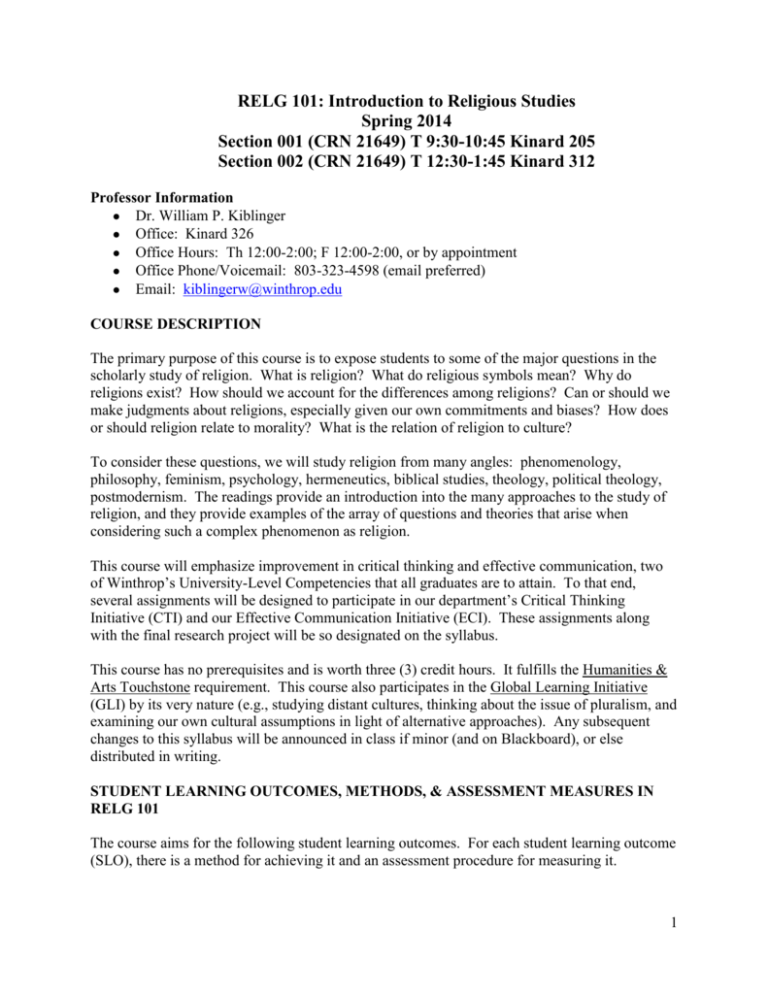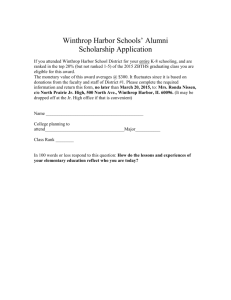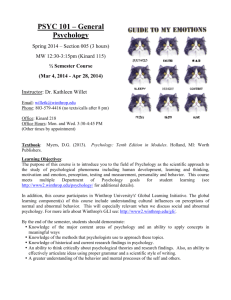
RELG 101: Introduction to Religious Studies
Spring 2014
Section 001 (CRN 21649) T 9:30-10:45 Kinard 205
Section 002 (CRN 21649) T 12:30-1:45 Kinard 312
Professor Information
Dr. William P. Kiblinger
Office: Kinard 326
Office Hours: Th 12:00-2:00; F 12:00-2:00, or by appointment
Office Phone/Voicemail: 803-323-4598 (email preferred)
Email: kiblingerw@winthrop.edu
COURSE DESCRIPTION
The primary purpose of this course is to expose students to some of the major questions in the
scholarly study of religion. What is religion? What do religious symbols mean? Why do
religions exist? How should we account for the differences among religions? Can or should we
make judgments about religions, especially given our own commitments and biases? How does
or should religion relate to morality? What is the relation of religion to culture?
To consider these questions, we will study religion from many angles: phenomenology,
philosophy, feminism, psychology, hermeneutics, biblical studies, theology, political theology,
postmodernism. The readings provide an introduction into the many approaches to the study of
religion, and they provide examples of the array of questions and theories that arise when
considering such a complex phenomenon as religion.
This course will emphasize improvement in critical thinking and effective communication, two
of Winthrop’s University-Level Competencies that all graduates are to attain. To that end,
several assignments will be designed to participate in our department’s Critical Thinking
Initiative (CTI) and our Effective Communication Initiative (ECI). These assignments along
with the final research project will be so designated on the syllabus.
This course has no prerequisites and is worth three (3) credit hours. It fulfills the Humanities &
Arts Touchstone requirement. This course also participates in the Global Learning Initiative
(GLI) by its very nature (e.g., studying distant cultures, thinking about the issue of pluralism, and
examining our own cultural assumptions in light of alternative approaches). Any subsequent
changes to this syllabus will be announced in class if minor (and on Blackboard), or else
distributed in writing.
STUDENT LEARNING OUTCOMES, METHODS, & ASSESSMENT MEASURES IN
RELG 101
The course aims for the following student learning outcomes. For each student learning outcome
(SLO), there is a method for achieving it and an assessment procedure for measuring it.
1
SLO 1: Each student will engage in reasoned inquiry and self-reflection regarding the various
values, beliefs, attitudes, and habits that define the nature and quality of life.
Method: Read material thoroughly and think critically in order to make connections
between the material and your own understanding of religious life.
Assessment of Student Learning Outcome: Students will take periodic quizzes on the
reading to ensure comprehension of the basic ideas. More in-depth writing assignments
will gauge their understanding of intertextual nature of the ideas in the course and their
implications for lived value systems.
SLO 2: Each student will model reflective participation in a learning community by learning to
communicate with others effectively in speech and writing.
Method: Share your reactions and understanding of religious issues with your classmates
and learn to understand other perspectives by listening carefully and communicating
clearly in class discussion and written assignments.
Assessment of Student Learning Outcome: Students are expected to display their
engagement with the ideas in the course on a daily basis in class discussions and will be
judged for the quality of their participation. Furthermore, students will write a
culminating reflection essay at the end of the course.
SLO 3: Each student will recognize the constructed nature of knowledge, i.e., the way in which
knowledge arises from a diversity of perspectives.
Method: Learn to identify multiple perspectives on religious issues and then engage this
diversity of perspectives by dialectically taking ownership of them as possible viewpoints
within yourself.
Assessment of Student Learning Outcome: Students will address the questions of the
origin of religious values and beliefs through reading assignments and follow-up writing
assignments on the tests, which will reveal the level of their recognition of the
constructed nature of knowledge.
SLO 4: Each student will recognize and appreciate human diversity (both past and present) as
well as the diversity of ideas, institutions, philosophies, moral codes, and ethical principles.
Method: Read and discuss the research relating to the diversity of religious beliefs and
practices and consider their impact on the values informing our lives.
Assessment of Student Learning Outcome: Students will display their ability to transcend
one form of consciousness and inhabit another through discussing and writing about
alternative religious systems. The reading assignments, discussions, quizzes, tests, and
final reflection essay will verify the level of their accomplishment in this regard.
2
RELG 101 AND UNIVERSITY-LEVEL COMPETENCIES
RELG 101 is part of the Touchstone Program, Winthrop University’s distinctive approach to
general education. Thus, RELG 101 helps students make progress toward the following
University-Level Competencies.
Competency 1: Winthrop graduates think critically and solve problems.
Winthrop University graduates reason logically, evaluate and use evidence, and solve
problems. They seek out and assess relevant information from multiple viewpoints to
form well-reasoned conclusions. Winthrop graduates consider the full context and
consequences of their decisions and continually reexamine their own critical thinking
process, including the strengths and weaknesses of their arguments.
Method: In RELG 101, students are required to use the critical tools of sociological,
anthropological, historical, and hermeneutical disciplines to analyze and interpret various
religious systems of belief and practice. The course requires discussion participation,
writing assignments, tests, and a presentation to assess students’ progress in this ULC.
Competency 3: Winthrop graduates understand the interconnected nature of the
world and the time in which they live.
Winthrop University graduates comprehend the historical, social, and global contexts of
their disciplines and their lives. They also recognize how their chosen area of study is
inextricably linked to other fields. Winthrop graduates collaborate with members of
diverse academic, professional, and cultural communities as informed and engaged
citizens.
Method: In RELG 101, students are introduced to a broad array of the world’s religions,
and they are required to reflect on their own assumptions in light of the different beliefs
and practices they encounter.
Competency 4: Winthrop graduates communicate effectively.
Winthrop University graduates communicate in a manner appropriate to the subject,
occasion, and audience. They create texts – including but not limited to written, oral, and
visual presentations – that convey content effectively. Mindful of their voice and the
impact of their communication, Winthrop graduates successfully express and exchange
ideas.
Method: In RELG 101, students discuss ideas and also write test essays, numerous
homework writing assignments, and a final project. The instructor incorporates
comments and suggestions not only on the content of each assignment but also the
effectiveness of their communication.
3
EXPECTATIONS OF THE STUDENT: This course will be a hybrid format, meeting once a week and
otherwise relying on Blackboard for significant elements of the course. I will expect you be in class and to
complete all assignments on time. You must plan ahead. I will be able to give extensions or make-ups only
in documented cases of serious illness or injury. Again, communication with me is vital. Let me know if
you face any difficulties.
1. Class Participation: Students are expected to participate during class discussions and in the online
Discussion Board. These activities cumulatively are worth 100 points.
2. Reading Assignments: There will be reading assignments on Blackboard, cumulatively worth 400
points.
3. Tests: There will be two tests, cumulatively worth 300 points.
4. Final Exam: The final exam will be worth a total of 200 points, comprised of a reflection essay (50
points) and a creative project (150 points).
GRADING
Discussion Board:
Reading Quizzes:
Tests:
Final Exam:
TOTAL
100 points
400 points
300 points
200 points
1000 points
Grading scale:
930-1000: A
870-899: B+
770-799: C+
670-699: D+
0-599: F
900-929: A830-869: B
730-769: C
630-669: D
800-829: B700-729: C600-629: D-
TEXTS
In Bookstore:
1. Mircea Eliade, The Sacred and the Profane: The Nature of Religion
2. Cunningham and Kelsay, The Sacred Quest (Prentice Hall)
3. John D. Caputo, On Religion
Reserve Readings:
4. Feuerbach & Marx, excerpts from Theories of Religion: A Reader (electronic handouts)
5. Friedrich Nietzsche, excerpt from The Gay Science (electronic handout)
6. Mary Daly, “After the Death of God the Father” (library electronic reserve)
7. Andrew Fuller, excerpts on Freud from Psychology and Religion, pp. 31-51, 57-63
8. David Winter, excerpts from Believing the Bible (library electronic reserve or HMXP textbook)
9. Hauer & Young, excerpt from Introduction to the Bible, “The Proclaimer: Jesus of Nazareth”, pp. 223228 and 244-259 (library electronic reserve)
10. Marcus Borg and N.T. Wright, The Meaning of Jesus: Two Visions (excerpts)
11. L. William Countryman, “New Testament Sexual Ethics and Today’s World”
12. Rita Gross, “Hindu Female Deities as a Resource for the Contemporary Rediscovery of the Goddess”
13. Georges Bataille, Eroticism: Death and Sensuality, pp. 11-25 (library electronic reserve)
14. Carl H. Esbeck, “Equal Treatment: Its Constitutional Status”
15. Rogers M. Smith, “‘Equal’ Treatment? A Liberal Separationist View”
4
STUDENT CONDUCT (INCLUDING PLAGIARISM): Students in this course should be aware of the
strong sanctions against plagiarism (misrepresentation of another person’s work as one’s own) stated in the
Student Conduct Code. If proven, a charge of plagiarism could result in an automatic "F" in the course and
possible expulsion. If you have any questions or doubts about what plagiarism entails or how to properly
acknowledge source materials and the works of others, be sure to consult the instructor. Proper citation
procedures are provided in all standard writing manuals. As noted in the Student Conduct Code:
“Responsibility for good conduct rests with students as adult individuals.” The policy on student academic
misconduct is outlined in the “Student Conduct Code Academic Misconduct Policy.” For more information,
see the Student Handbook at http://www2.winthrop.edu/studentaffairs/handbook.
Turnitin: We will also use the Turnitin website, so please register with the site if you have not
previously done so. The URL is http://www.turnitin.com/en_us/home. If you need instructions
on how to do this, see here: http://www.turnitin.com/en_us/support/help-center/enrolling-in-aclass.
RELG 101 ID Number: 7472642
Password: [I will tell you on Blackboard.]
STUDENTS WITH DISABILITIES: Winthrop University is dedicated to providing access to education.
If you have a disability and need classroom accommodations, please contact Gena Smith, Coordinator,
Services for Students with Disabilities, at 323-3290, as soon as possible. Once you have your Professor
Notification Form, please tell me so that I am aware of your accommodations well before the first
{test/paper/assignment}.
SAFE ZONE: Regardless of sexual orientation, race, ethnicity, national origin, gender, religion,
age and ability, you will be treated and respected as a human being. Your continued presence in
this course signals your commitment to act likewise.
ACADEMIC SUCCESS CENTER: Winthrop’s Academic Success Center is a free resource
for all undergraduate students seeking to perform their best academically. The ASC offers a
variety of personalized and structured resources that help students achieve academic excellence,
such as tutoring, academic skill development (test taking strategies, time management
counseling, and study techniques), group and individual study spaces, and academic coaching.
The ASC is located on the first floor of Dinkins, Suite 106. Contact the ASC at 803-323-3929 or
success@winthrop.edu. For more information on ASC services, please visit
www.winthrop.edu/success.
BLACKBOARD: Instructions for Logging into Blackboard
1. Go to http://online.winthrop.edu.
2. Click on the link for “New Blackboard.”
3. Please note: You will not use the WebCT “wu_” login for Blackboard. Log into
Blackboard with the same user name and password as you use to login to Winthrop
email. For example:
a. Username: whetstonek2
b. Password: Enter Your Winthrop Email Password
5
4. After you log in, on the right side of the screen, in the My Courses module, click on the
title for your course.
5. Once inside the course, use the menu on the left side of the screen to navigate through the
course. Note: If you do not see the menu on the left side of the screen, it may be
hidden. Click on the arrow on the left side of the screen to reveal the menu.
Need Blackboard Help?
1. Log in issues: Please contact the help desk at 323-2400 or helpdesk@winthrop.edu.
2. Tutorials: You can find helpful tutorials for using Blackboard at the following web site:
http://www2.winthrop.edu/webct/Blackboard_Training_Tutorials.html.
3. Blackboard User’s Guide: You can find the Blackboard user’s guide by logging into
Blackboard, and at the very top of the screen, click on the Help link, and then click on
User Guide. You can search for a specific topic that you need help with.
4. For additional assistance: Please contact Kimarie Whetstone, Online Learning
Coordinator at 323-2551 or whetstonek@winthrop.edu.
DATE: The date
the assignment is
due (before
class)
Unit 1
Tues., Jan. 21
Unit 2
Tues., Jan. 28
TOPIC: This area describes the
subject matter we will be studying
for each week of the term.
Religious Phenomena
What is religion? How and why is it
studied? Key concept: Sacred Space
Religious Phenomena
Sacred Time; Sacredness of Nature;
Human Existence and Sanctified Life
Unit 3
Tues., Feb. 4
Modernity and Its Critics
Passing through the “Brook of Fire”
(literally, Feuerbach’s name)
Readings by Marx, Nietzsche, and
Daly
Unit 4
Tues., Feb. 11
Psychology of Religion
Freud’s Account of Religion
Coping with Evil
Tues., Feb. 18
Final discussion before the test
Unit 5
Test
Fri., Feb. 21
(due at 11:59 PM)
Tues., Feb. 25
Opening lecture on next unit
(nothing due)
ASSIGNMENT: Do the readings below,
then the reading quiz on Blackboard, and
then add at least two comments to the
Discussion Board forum for that week.
The Sacred Quest, ch.1-2 (pp. 1-36)
Mircea Eliade, ch. 1
Eliade, ch. 2, ch. 3, and part of ch. 4 (pp.
162-7; 201-13)
Suggested Reading: The Sacred Quest, ch. 3
1. Feuerbach & Marx, excerpts from
Theories of Religion: A Reader
2. Nietzsche, “The Madman” (from The Gay
Science)
3. Mary Daly, “After the Death of God…”
Excerpt from Andrew Fuller, Psychology
and Religion, pp. 31-51, 57-63
The Sacred Quest, ch. 7
None
Test 1 (CTI and ECI)
None
6
Unit 6
Tues., March 4
Unit 7
Tues., March 11
Unit 8
Tues., March 25
Unit 9
Tues., April 1
Unit 10
Tues., April 8
Unit 11
Tues., April 15
Unit 12
Tues., April 22
Hermeneutics
The Languages of the Sacred: Reading 1. The Sacred Quest, ch. 4
the Bible
2. David Winter, Believing the Bible (on
electronic reserve, but also found in recent
editions of the HMXP textbook)
3. Hauer & Young, excerpt from
Introduction to the Bible, “The Proclaimer:
Jesus of Nazareth,” pp. 223-228 and 244-259
Biblical Studies and Sexuality
Interpreting Jesus as the Christ
1. Borg and Wright, excerpts from The
Sexuality and Religion
Meaning of Jesus: Two Visions, pp. 3-14 and
129-142.
2. Countryman, “New Test. Sexual
Ethics…”;
Watch the film For the Bible Tells Me So
Embodiment and Religion
Hindu Goddesses and Sexuality;
Rita Gross, “Hindu Female Deities…”
Mysticism and the Erotic
Georges Bataille, Eroticism: Death and
Sensuality, pp. 11-25
Politics and Religion
Church and State
1. Carl H. Esbeck, “Equal Treatment: Its
Constitutional Status”
2. Rogers M. Smith, “‘Equal’ Treatment? A
Liberal Separationist View”
Suggested Reading: The Sacred Quest, ch. 8
Test
Test 2 (CTI and ECI)
Postmodern Religion
Post-secular Religion
Caputo, ch. 1 & 2
Postmodern Religion
Religion and Culture
Caputo, ch. 3 – 5
Final Exam Date:
RELG 101-001 Fri., May 2 at 11:30 AM
RELG 101-002 Thurs., May 1 at 11:30 AM
7




